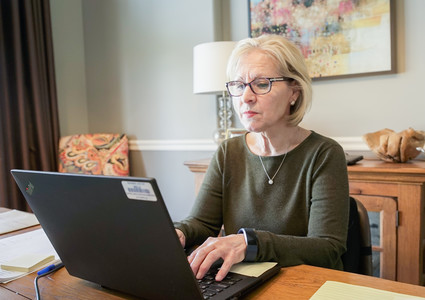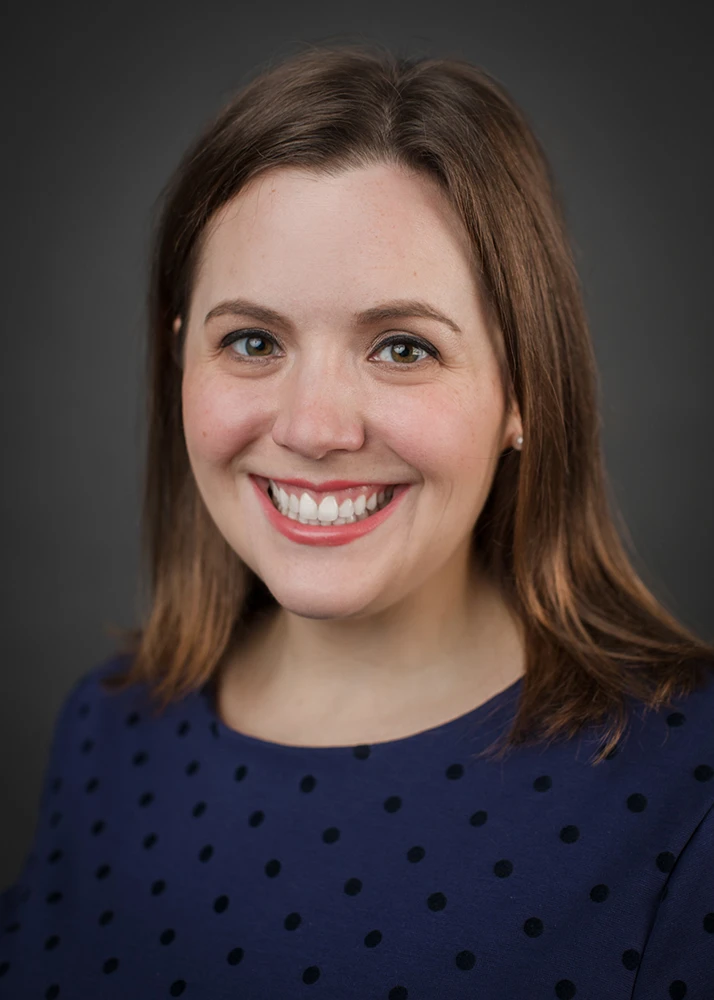




The Meaning of Care Magazine
As Mental Health Crisis Grows, So Does Access to Help
Published: Nov. 25, 2020

Continuing Care
“We had to change how we provided services pretty much on a dime,” said Jean Faber, corporate director of the Best Care Employee Assistance Program (EAP) and the Methodist Hospital Community Counseling Program.
With the help of Methodist’s information technology (IT) team, counselors with Best Care EAP and the Community Counseling Program transitioned to telehealth in the weeks following Nebraska’s first confirmed COVID-19 case. The Community Counseling Program, which places mental health practitioners in each middle school, high school and alternative program in Omaha Public Schools as well as in churches and community centers, also faced a loss of office space and immediate access to its clients.
As IT worked to equip everyone with secure telehealth access in their homes, counselors like Char Hills, LCSW, LIMHP (pictured above), were contacting parents and clients and gathering community resources for anyone needing food or financial assistance.
“I’m really proud of the program,” she said. “We got into action and made ourselves available, letting clients know that we’re here to continue providing services for them.”
Reassuring patients that services were continuing was a priority for the behavioral health team at Methodist Fremont Health as well.
“We just kept saying to our patients: ‘We’re here. Don’t be afraid to call in. We’re going to take care of you,’” said Mary Ellis, APRN, RN.
The hospital’s outpatient clinic quickly transitioned to telehealth while the inpatient center was equipped to utilize the option. Psychiatrist John Franzen, MD, said the inpatient center also needed to ensure that patients coming into the hospital felt safe and comfortable. That meant adopting early COVID-19 screening policies and getting tests for those who needed them.

Community Counseling Program who worked the
Methodist Emotional Support Line from home.
Addressing a Need
With the transition to telehealth progressing, some felt there was a further mental health need in the community. Inspired by the success of the Methodist Coronavirus (COVID-19) Hotline for those experiencing COVID-19 symptoms, Faber and Methodist Hospital Foundation President and Chief Executive Officer Tracy Madden-McMahon had an idea for a mental health hotline staffed by counselors like Hills from the Community Counseling Program. The Methodist Emotional Support Line launched on March 30 after quick work from the IT team.
Kent Sona, Methodist’s vice president of IT and chief information officer, is proud of his department’s teamwork in so quickly mobilizing telehealth and the Methodist Emotional Support Line. It’s personal for him – his son lost his battle with depression and died by suicide two years ago.
“To be able to give the community a resource that they can reach out to honestly meant the world to me,” he said. “And for our team, it was great knowing you’re not only helping the health system, but you’re also helping your community, your neighbors and your friends.”
Knocking Down Barriers
At Methodist Fremont Health, both Dr. Franzen and Ellis said that telehealth has eliminated barriers for those who are unable or anxious to leave their homes. They’ve seen remarkable declines in patient no-shows, and Ellis said that older adults have overcome initial anxiety over using the technology. She even sees telehealth as more personal than in-person visits.
“In this particular situation, patients allow you into their homes,” she said. “They’re allowing you into their lives. I feel like communication is much more genuine, and people are more honest.”
Best Care EAP counselor Ralph Orsi, MS, LIMHP, NCC, who finds himself in back-to-back sessions all day, said the move toward telehealth had been gaining momentum industrywide for some time but was just pushed forward by COVID-19.
Because the barrier to access has been knocked down, Dr. Franzen predicts telehealth is here to stay even after the pandemic ends. Ellis agrees.
“Who says that every single appointment is going to go back to in-person?” she said.
A Growing Crisis
A June survey published by the Centers for Disease Control and Prevention recommended the expansion of telehealth as a way of curbing the mental health consequences of the pandemic. The survey also offered a glimpse at concerning trends: 40.9% of adults reported having behavioral health symptoms, and 10.7% of adults had recently thought about suicide.

The national trends are consistent with what Hills is seeing through her work with the Methodist Emotional Support Line.
“We’re definitely seeing increased anxiety and depression,” she said. “The uncertainty is the big thing. Then the isolation of not being able to get out and see your friends and family.”
The list of issues people call about includes: anxiety, depression, uncertainty, fear, anger, illness, social unrest, political unrest, financial insecurity, food insecurity, struggles with remote learning, domestic abuse, substance abuse, loneliness, social isolation, suicide and grief.
With winter comes concerns that the pandemic will exacerbate seasonal and existing mental health conditions. But Dr. Franzen sees hope.
“People’s ability to get care is as accessible as it’s ever been,” he said. “That’s the hopeful piece. There are really good treatment options out there where they can get support.”
A Sign of Strength
As the COVID-19 pandemic has continued, the national conversation around mental health has gotten louder.
“More and more people are realizing how important it is to pay attention to mental health – how it truly is the foundation to our overall health and well-being,” Faber said.
Faber said that business has grown at Best Care EAP as more employers seek mental health services for their employees. But the stigma surrounding mental health lingers.
“Sometimes it just takes a session to get yourself back on your feet,” Orsi said. “Why deny yourself that opportunity? If you sprained your ankle and you couldn’t walk, you wouldn’t go, ‘Well, I’m not going to go to the doctor.’ Our mental health is just as important.”
“Asking for help is not a weakness,” Faber added. “Being able to recognize when you need support and reaching out for it is a sign of strength.”
You are not alone. These resources can help:
- Methodist Emotional Support Line: (402) 815-8255 (TALK)
- Best Care EAP: (402) 354-8000
- National Suicide Prevention Lifeline: (800) 273-8255
Photos by Daniel Johnson
More Resources
- Read more from the winter 2020 issue of The Meaning of Care Magazine.
- Learn more about social isolation and its links to suicide.
- Read about the Methodist Hospital Community Counseling Program's unique approach to counseling.


